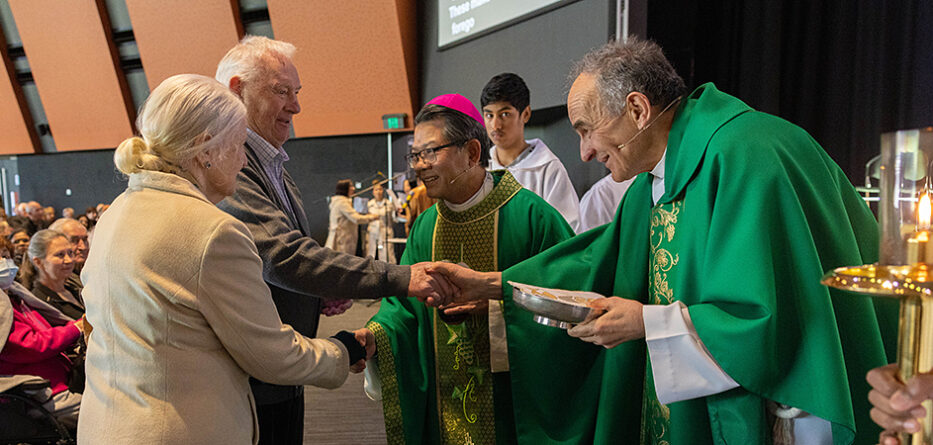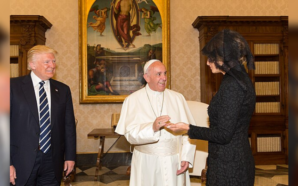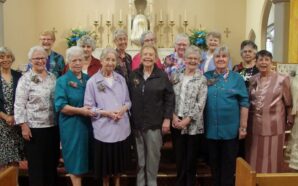We’re in that part of the year known as Ordinary Time. Fr Dave Austin OSA tells us how ‘ordinary’ Sundays are so much more than downtime.
Our experience of liturgy this year has been very rich – the Christmas Season, Lent, Holy Week and the Triduum, the Easter Season, then the great feasts of Pentecost, Holy Trinity and the Body and Blood of Christ – bold reminders of our Catholic Faith! Each expands our understanding of the Paschal Mystery which we celebrate every Sunday.
The liturgical year honours the Mystery of Christ in its fullness, so Ordinary Time is definitely not ‘ordinary’! ‘Ordinary’ – from the Latin ordo – refers both to a counting or numbering and an order – the counted weeks. Ordinary Time occurs twice each year in the liturgical calendar – beginning after the Baptism of the Lord in January and ending on the Tuesday before Ash Wednesday, and then from the Monday after Pentecost until the Saturday before the First Sunday of Advent.
This year, we celebrated the Second to the Seventh Sundays in Ordinary Time between the Baptism of the Lord and Ash Wednesday. Ordinary Time resumed on 29 May and included the Sunday Solemnities of the Trinity and the Body and Blood of Christ on 4 and 11 June respectively. The Sundays in Ordinary Time then continue with the 11th Sunday on 18 June.
Ordinary Time is not an invitation to put our feet up and have a rest from serious liturgy – definitely not ‘downtime’! As we continue to celebrate the Paschal Mystery, these Sundays are by no means ‘ordinary’ or unimportant. Ordinary Sundays have been described as ‘simply and gloriously only Sunday, the Lord’s Day’. Sunday defines who we are as the Christian Community.
Green vestments are worn except on feast days and Sundays when a major Feast of Our Lord, Our Lady or Holy Day occurs. This year, the Transfiguration of the Lord on 6 August replaces the 18th Sunday in Ordinary Time. The Feasts of All Saints and All Souls in November help us connect with the Communion of Saints and with those who are with the Lord and whom we carry in memory. Why not sing the Litany of the Saints as we gather for Sunday Eucharist around that time? Then there is the Book of the Names of the Dead that can be reverenced in some way in the Mass.
Reflection on Jesus’ encounter with the two disciples on the road to Emmaus (Luke 24) is helpful here. As their conversation unfolded, the disciples’ sad story of their loss of Jesus in death became their ‘faith story’ as Jesus broke open the Scriptures for them and their eyes were opened as they recognised Jesus in the Breaking of the Bread. This describes well the dynamic we are invited to experience throughout the Liturgical Year. We grow in self-knowledge as we engage with both our sad stories and joyful stories and they become part of our personal and communal ‘faith story’.
All liturgy celebrates Christ’s saving work, the Good News of his Death and Resurrection.
God’s Word is proclaimed and preached and we listen to the Sunday readings in the three-year cycle, with the focus on a different Gospel each year. In 2023 (Year A), Matthew’s Gospel exposes us to Jesus’ life and ministry – the Sermon on the Mount, the spread of God’s Kingdom, miracles and parables, the beginnings of the Church, our call to love ‘the least of these…’, and Jesus’ death and resurrection. The final Sunday in Ordinary Time is the Solemnity of Christ the King.
Ordinary Time offers many opportunities to ‘refresh’ our celebration – learning new hymns and Mass settings, varying decoration by changing the banners, wise use of visual media, and of course commemorations such as Mother’s Day, Father’s Day, Social Justice Sunday, NAIDOC Week, all of which can link faith and life.
Of course, supporting our understanding of the Gospel through good homilies and other forms of catechesis is always a given. Our goal is always ‘full, conscious and active participation’ as we strive to connect the Sunday Eucharist and our daily living.
As we gather for Eucharist, we the Assembly are the primary presence of Jesus – the Body of Christ, an affirmation of St Augustine’s invitation to Eucharist in Sermon 272: “Be what you see and receive what you are!” Indeed, just as the bread and the wine are changed into the Body and Blood of Jesus, so we must go forth from Eucharist changed: “Go in peace, glorifying the Lord by your life!”
Now there’s nothing very ‘ordinary’ about that!
Fr Dave Austin OSA is Assistant Priest of Holy Spirit Parish, St Clair-Erskine Park.
This article was originally published in the 2023 Ordinary Time | Winter edition of the Catholic Outlook Magazine. You can read the digital version here.









